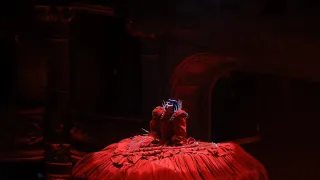September 14, 2017
mother!
Robert Nesti READ TIME: 4 MIN.
The first warning should be the title: "mother!" With its lower-case first character and exclamation point, it may have the most affected title of the year. The second should be that the film, written and directed by Darren Aronofsky, was greeted with boos when it premiered last week at the Venice Film Festival - the kind of venue that usually worships his fevered visions. And the third comes with the characters names, which consist of such archetypical terms as Mother, Him, Man, Woman, Older Son, Younger Brother, as if the film is some kind of mystical allegory.
But nothing prepared me for this jumbled mess of pretentious phantasmagoria that persists for nearly two hours, well past the running time for what could have been an episode of the anthology series "Black Mirror." Shorter and sweeter, it may have worked. Stretched to nearly two hours, it is a confusing metaphor that wears its welcome out well before its conclusion. Can I get my two hours back, please?
Aronofsky has made his career out of psychological dramas that unfold like vivid dreams - think "Requiem for a Dream" and "Black Swan;" "mother!" fits the mold, but without the push and pull between fantasy and reality that made those films so compelling. Instead "mother!" is indulgent, disorienting and downright opaque. Is it an ugly allegory about a woman's pregnancy? A celebrity's need for fame? Global warming? (No joke. The latter was suggested by Aronofsky and Jennifer Lawrence, the film's star whom he is dating at the Toronto Film Festival recently.) Fill in the blanks and send in the clowns.
The situation is simple: the title character, played by Jennifer Lawrence, is married to a famous poet, called Him (an overbearing Javier Bardem). They live a seemingly idyllic life in a fantastic Victorian-styled house in the middle of the country that she is painstakingly restoring. The house, owned and occupied by the Poet, had burned down sometime earlier. He lost everything, save for a mysterious crystal (lined with glowing orange seams) that sits on a small pedestal in his study. While everything looks ideal on the surface, there is trouble in paradise: The poet suffers from writer's block, and there's a general sense of unease in the relationship, but not for reasons immediately apparent.
That rupture comes to the surface with the arrival of the Man, (yes, called the Man and played by a menacing Ed Harris) who arrives late one night thinking the house is a bed and breakfast. The poet is charmed, especially when he learns his visitor is a fan, and has him stay, much to his wife's chagrin. Things get further complicated when Man's wife (the Woman played with bitchy elan by Michelle Pfeiffer) arrives the next day. The poet is delighted to have the couple stay, Mother much less so, especially since neither of the guests pays any attention to the house rules that she vainly hopes they'll follow. (The Man smokes wherever he pleases, the Woman insists on entering the poet's study despite being told not to.)
The interplay between the couples, including a nasty encounter with the sons of the Man and Woman, make up the film's first half, which plays like sub-verbal Edward Albee. (Albee played out the same situation with much more satisfying, though less fantastical results in his play "A Delicate Balance.") Here there is not much dialogue and what there is isn't particularly memorable. Suffice to say that as Mother gets more and more annoyed while her husband is more and more enamored of the attention by his visitors.
Things only get worse in the film's second half. The now-pregnant Mother must contend with hordes of Him's fans, who take over the house and begin to destroy it. Plus there are supernatural elements that may or may not be real, such as a blood stain on the floor that bleeds into the basement. What it all means is open to conjecture. Along the way, Aronofsky offers shock effects, including a particularly ugly one towards the film's end, that play like supernatural red herrings.
Mother's pregnancy brings to mind "Rosemary's Baby," which also deals with the psychological disintegration of its title character as her pregnancy comes to term; but where Polanski's film cooly chronicles how Rosemary's loses her grasp on reality, Aronofsky's plays Mother's seeming slink into madness as a cruel joke. No one listens to her or even cares for her, even as she's coming to term. She is seen as the docile wife - there to clean up and bring order to the home; but when chaos ensues, no one listens to her complaints. Making matters worse is that Aronofsky captures her every confused or angry expression in withering close-ups. Kudos to Lawrence for allowing herself to be filmed this way in a performance that sits somewhere between brave and silly. (The claustrophobic photography is by Aronofsky's house cinematographer Matthew Libatique.)
No doubt some see the film's sexual politics as some sort of dark commentary on contemporary marriage, but it is uncomfortable to see it play out in such a sadistic manner as it is here. As for what it all means, who knows? "mother!" is a Rorschach Test for viewers -- is it a black comedy? A psychological thriller about the fears of motherhood? A dark look at marriage? An allegory about climate change? It is anything you want it to be. Many appear to enjoy its hyped-up fantasy and allegorical subtexts. For me, it is just proof that the emperor has no clothes. Aronofsky pushes the envelope once again, but with diminishing returns. In the end, he has created a bloated, pretentious psychological melodrama. I only hope there's not a "mother 2!"
Robert Nesti can be reached at [email protected].







